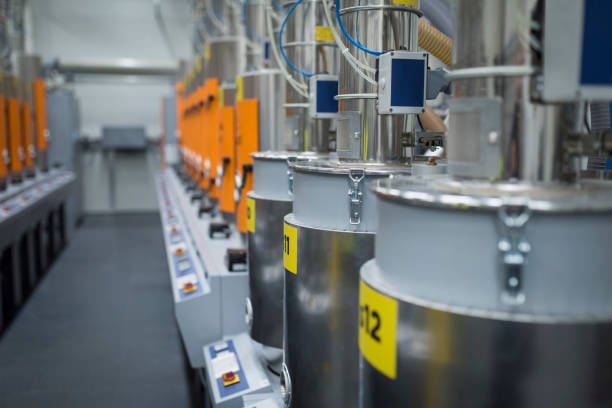
The role of a Production Planner in chemical manufacturing has become increasingly challenging. As global demands surge, supply chains become more complex, and competition intensifies, planners must find innovative solutions to optimize production schedules, reduce downtime, and enhance overall efficiency. The integration of machine learning into the scheduling process can be a game-changer, and when combined with cutting-edge software like PlanetTogether, the results are truly transformative.
In this blog, we will explore how machine learning can revolutionize predictive scheduling in continuous manufacturing, with a focus on integrating PlanetTogether with leading ERP, SCM, and MES systems like SAP, Oracle, Microsoft, Kinaxis, and Aveva.
The Evolution of Production Planning
Production planning has come a long way since its inception, from manual spreadsheets to sophisticated software solutions. Yet, even with these advancements, traditional planning methods often fall short in handling the complexities of continuous manufacturing processes. Frequent machine breakdowns, variable raw material supplies, and fluctuating demand patterns make it challenging for planners to devise schedules that are efficient and responsive.
Machine Learning in Continuous Manufacturing
Machine learning, a subset of artificial intelligence, empowers planners with the ability to analyze vast amounts of data, recognize patterns, and make data-driven decisions. With access to real-time data from various sources like sensors, IoT devices, and historical records, machine learning algorithms can uncover valuable insights that aid in accurate demand forecasting and predictive scheduling.
Advantages of Predictive Scheduling
Minimizing Production Downtime: Predictive scheduling allows planners to anticipate machine breakdowns or maintenance requirements, scheduling preventive measures before an actual issue occurs. This minimizes unplanned downtime and improves overall production efficiency.
Optimizing Resource Allocation: Machine learning algorithms can analyze resource utilization patterns and recommend optimal allocation, ensuring that the right resources are available at the right time.
Improving Delivery Performance: By accurately forecasting demand and optimizing production schedules, predictive scheduling enables chemical manufacturers to meet customer demands promptly, enhancing delivery performance.
Reducing Inventory Costs: Efficient scheduling helps prevent overproduction and excessive inventory levels, leading to reduced carrying costs and waste.
Introducing PlanetTogether: A Game-Changing Scheduling Solution
PlanetTogether is a cutting-edge advanced planning and scheduling (APS) software that has garnered widespread recognition for its ability to streamline production scheduling. With its user-friendly interface, powerful optimization capabilities, and comprehensive data analysis, PlanetTogether is an ideal platform for integrating machine learning into the scheduling process.
The Integration of PlanetTogether with ERP, SCM, and MES Systems
PlanetTogether with SAP: Integrating PlanetTogether with SAP enables seamless data exchange between production scheduling and resource planning, enhancing visibility and coordination across the organization.
PlanetTogether with Oracle: By integrating PlanetTogether with Oracle's ERP system, chemical manufacturers can leverage predictive scheduling insights to improve inventory management and supplier collaboration.
PlanetTogether with Microsoft Dynamics: The combination of PlanetTogether and Microsoft Dynamics ERP allows for streamlined scheduling and resource allocation, maximizing operational efficiency.
PlanetTogether with Kinaxis: Integrating PlanetTogether with Kinaxis RapidResponse facilitates real-time data synchronization, empowering planners to make proactive decisions in a dynamic manufacturing environment.
PlanetTogether with Aveva: The integration of PlanetTogether with Aveva's comprehensive MES system offers end-to-end visibility and control, optimizing production schedules based on real-time data.
Implementing Machine Learning in Predictive Scheduling
Data Collection and Preparation: To deploy machine learning for predictive scheduling, data collection from various sources is crucial. This includes historical production data, sensor data, weather forecasts, market trends, and customer demands.
Algorithm Selection: Different machine learning algorithms, such as regression, decision trees, and neural networks, can be applied to analyze the collected data and identify patterns.
Model Training and Validation: The selected algorithm is trained using historical data, and the model's performance is validated against real-world scenarios to ensure accuracy and reliability.
Integration with PlanetTogether: Once the machine learning model is validated, it is integrated into PlanetTogether to enhance the scheduling process with predictive insights.
Overcoming Challenges in Implementation
Data Quality and Integration: Ensuring data accuracy and integrating data from various sources can be a significant challenge. Implementing data governance practices and utilizing robust integration tools can address this issue.
Change Management: Adopting new technology and practices can be met with resistance. Effective change management strategies are vital to facilitate smooth adoption and implementation.
Continuous Improvement: Machine learning models require periodic updates to maintain accuracy and relevance. Regularly evaluating the performance of the integrated system and making necessary adjustments is critical for sustained success.
Predictive scheduling powered by machine learning, integrated with advanced scheduling software like PlanetTogether and leading ERP, SCM, and MES systems, is a game-changer for production planners in the chemical manufacturing industry. Embracing this technology-driven approach empowers planners to optimize production schedules, reduce downtime, improve delivery performance, and minimize inventory costs. As the industry embraces the transformative potential of machine learning, we are entering a new era of efficiency and competitiveness in continuous manufacturing.





















LEAVE A COMMENT